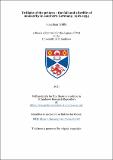Twilight of the princes : the fall and afterlife of monarchy in southern Germany, 1918-1934
Abstract
This thesis is a comparative investigation into the afterlives and legacies of dynastic monarchy in southern Germany. Within a few days in November 1918, Germany’s monarchical edifice collapsed, suddenly and completely. In all twenty-two of the Kaiserreich’s monarchical states, the sovereign was overthrown as councils of soldiers and workers assumed power and the people’s flag was unfurled in triumph from castle turrets. Despite spelling the end for an ancient social and political order—and concurrently creating the first German republic—these events and their consequences are curiously under-researched. As Karl Ferdinand Werner observed in 1985, they remain historiographical “non-events.” The present study addresses this lacuna by examining the processes, experiences, and consequences of what may be termed the ‘de-monarchification’ of Germany after 1918—namely, its transition from a patchwork of principalities to a centralised state of republican provinces. It asks how this change unfolded and under whose direction; how it was received by the deposed dynasties and their former subjects; which elements of the monarchy were repealed and replaced; and which were merely adopted and adapted. In short, by isolating how, when, and where the German people encountered and engaged with monarchy after 1918, the thesis seeks to determine how great a caesura the revolution truly was.
These questions are approached from three perspectives in three states—Hessen, Bavaria, and Württemberg. Chapters one to three firstly consider the republican leaders unexpectedly brought to power and faced with the herculean task of dismantling and replacing their monarchical inheritance. Chapters four and five then investigate how the deposed royal dynasties experienced the revolution and the republic, both as individuals and as members of a wider national and transnational social class. Chapter six, finally, considers popular responses to the upheaval and the fate of monarchism and dynastic loyalty amongst the German people. The thesis concludes that November 1918 did not signal the end for monarchy in Germany. Whether through the dynasties, who remained visible and active in their states, or through questions of de-monarchification, which dominated government agendas, monarchy remained present and demanded attention. At the constitutional level, its removal had been almost total, but its cultural roots remained strong and were, in some cases, institutionalised and made part of the new republican order. The revolution thus inaugurated the twilight of the princes; their formal influence and power had passed beyond the historical horizon, but they continued to cast a light by which historians may examine continuities in recent German history and the political culture of its most familiar and critical period.
Type
Thesis, PhD Doctor of Philosophy
Rights
Embargo Date: Embargo Reason: Early release of thesis embargo requested, thesis made available in accordance with University regulations
Collections
Items in the St Andrews Research Repository are protected by copyright, with all rights reserved, unless otherwise indicated.

